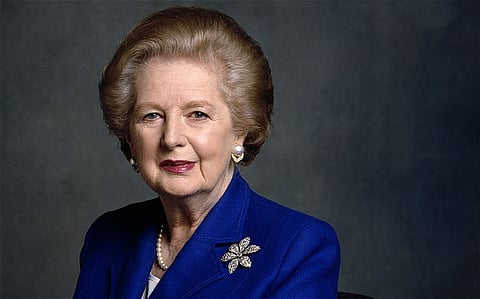How to get over losing an empire
Proud imperialists, such as today’s Republican candidates in US, insist the loss could be easily reversed if certain leaders weren’t traitors

For Britons of a certain age, Donald Trump’s campaign slogan, “Make America great again”, rings a bell. In the 1987 British elections, Margaret Thatcher’s campaign slogan was “Britain is great again. Don’t let Labour wreck it”.
Of course, I’m not accusing Trump of plagiarism. America’s next presidential hopeful is a winner, a magnanimous figure who has even won the praise of Vladimir Putin. However, his echo of Thatcher is not coincidental. Like Britain before it, the United States is now losing its empire.
This is a painful problem that’s hard to talk about. Often it’s accompanied by feelings of shame. The fading empire’s leaders always pretend that the loss isn’t happening. Proud imperialists, such as today’s Republican candidates, insist the loss could be easily reversed if only certain leaders weren’t pygmies and traitors. The anger just worsens the pain. However, it is possible to be post-imperial and happy. The British are, at least on their good days. Here are some tips for coping with loss of empire.
The first step is to be straight with yourself. Look in the mirror and say: “I am losing my empire, but it needn’t be traumatic.”
Accept the loss as inevitable. True, the US still has the world’s strongest military, but that’s like Kodak being the world’s leading maker of camera film: It’s an obsolete skill. Only once since the Second World War has the US secured its national interests through war: The defeat of Saddam Hussain in 1991. If Americans want to keep a large military as a jobs project, or a Keynesian stimulus programme that dare not speak its name, that’s fine. But having lived through the past 14 years, they must know that a military isn’t much use at fighting a global terrorist franchise. Nor can it stop Russia from invading former Soviet republics, unless Americans are willing to fight the Third World War.
When you lose your empire, it’s perfectly normal to worry that you will become poorer. “The prosperity of our people”, argued the British conservative politician, Julian Amery, in 1962, “rests really on the oil in the [Arabian] Gulf, the rubber and tin of Malaya, and the gold, copper and precious metals of south and central Africa.” If those went, he warned, “we would lose the lot”.
This kind of argument (now echoed in Trump’s scheme to grab Iraqi oil) makes psychological sense. After all, it’s an empirical fact that economic wealth and imperial acquisition go together. However, Americans needn’t worry: It’s the wealth that prompts the acquisition, not the other way round. Having an empire doesn’t necessarily make you rich. Indeed, when Britain and France shed their empires, their economies boomed. Buying other countries’ stuff is easier than grabbing it through conquest.
But the damage done by loss of empire is, above all, psychological. The post-imperial country is left feeling futile and pointless. I recently met an old British army officer at his gentleman’s club in London. Sitting beneath portraits of Victorian generals who had conquered places like Sudan, he scoffed that today’s Britons were softies who preferred creature comforts to greatness. He missed the empire like a lost limb.
Luckily, there are some simple post-imperial techniques to make you feel great again. The best is probably winning a small war. Thatcher did it in the Falklands (hence her 1987 slogan), but the textbook example was the American invasion of tiny Grenada (population 90,000) under president Ronald Reagan in 1983. This was an un-losable war. Reagan’s biographer Garry Wills noted: “Two-thirds of American casualties were inflicted by other Americans or by accident.” Coming two days after a terrorist truck bomb killed 241 US service personnel in Beirut, the invasion helped to cheer up Americans.
Having restored military pride, Reagan then quietly withdrew US troops from Lebanon. The sequence was a masterclass in post-imperialism. No wonder British politicians now reach hopefully for their sabres whenever a Spanish politician mentions its pocket-sized imperial remnant, Gibraltar.
There are other routes to post-imperial glory. You can win a football World Cup. Since the Suez debacle of 1956, the British have also found their kicks in what historian Robert Skidelsky calls “vicarious imperialism”. This is usually safe — a simple matter of banging on about the “special relationship” whenever the US bombs somebody — but, as Tony Blair found in Iraq, vicarious imperialism can go horribly wrong.
The most enjoyable way to cope with post-imperialism is to laugh at yourself. The British have been doing this since Suez. In 1957, in his play The Entertainer, John Osborne created the faded old comedian Archie Rice to symbolise a faded old country. Rice boasts: “I’ve played in front of them all. The Queen, the Duke of Edinburgh, the Prince of Wales, and the ... what was the name of that other pub?”
Ideally, the US would now replace Trumpian anger with humour about national decline. The TV comedian John Oliver — a Briton raised on post-imperialism — could lead the way, until, eventually, declinist jokes become so cliched that they reach the big networks. That will be the sign the US has gotten over empire.
— Financial Times


